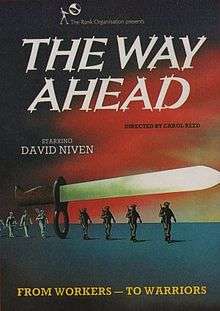The Way Ahead
| The Way Ahead | |
|---|---|
 | |
| Directed by | Carol Reed |
| Produced by |
John Sutro Norman Walker |
| Written by |
Eric Ambler Peter Ustinov |
| Starring |
David Niven Stanley Holloway William Hartnell |
| Music by | William Alwyn |
| Cinematography | Guy Green |
| Edited by | Fergus McDonell |
Production company | |
| Distributed by | GFD |
Release dates |
|
Running time | 115 min. / 91 min. (USA) |
| Country | United Kingdom |
| Language | English |
The Way Ahead is a British Second World War drama released in 1944. It stars David Niven and Stanley Holloway and follows a group of civilians who are conscripted into the British Army to fight in North Africa. In the U.S., an edited version was released as The Immortal Battalion.
The film was written by Eric Ambler and Peter Ustinov and directed by Carol Reed. The three had originally produced the 1943 training film The New Lot, which was produced for the Army Kinematograph Service. The Way Ahead was an expanded remake of their earlier film, this time intended for a commercial audience. The two films featured some of the same actors, including John Laurie, Raymond Huntley and Peter Ustinov. Niven, a 1930 graduate of Sandhurst, was at the time a major in the British Army working with the Army Film Unit and later served in Normandy with GHQ Liaison Regiment.
Plot
In the days after the Dunkirk evacuation in Second World War, recently commissioned Second Lieutenant Jim Perry (David Niven), a pre-war Territorial private soldier and a veteran sergeant of the British Expeditionary Force, is posted to the (fictional) Duke of Glendon's Light Infantry, known as the 'dogs', to train replacements to fill its depleted ranks. A patient, mild-mannered officer, he does his strenuous best to turn the bunch of grumbling ex-civilians into soldiers, earning himself their intense dislike. The conscripts also believe that their sergeant is treating them with special severity; in fact, he is pleased with the way they are developing and has his eye on some of them as potential NCOs. Eventually however, the men come to respect their officer.
After their training is completed, their battalion is shipped out to North Africa to face Rommel's Afrika Korps. However, their ship is torpedoed en route, and they are forced to abandon ship; their sergeant is trapped under a burning tank and is rescued by several of the men. They are returned to Gibraltar, so miss the fighting.
When they eventually get to North Africa, they are assigned to guard a small town. Perry appropriates a cafe as his headquarters, much to the disgust of the pacifist owner, Rispoli (Peter Ustinov). When the Germans attack, Perry and his men fiercely defend their positions, aided by Rispoli. At one point, the Germans invite them to surrender, with the response 'Go to Hell!'
The last scene shows them advancing in a counter-attack. Instead of the film ending with the words "The End", it concludes with the more uplifting "The Beginning", an attempt to galvanize support for the final push in the war effort.
The final scene of the advancing soldiers was also copied for the closing credits of the long-running sitcom Dad's Army; John Laurie appeared in both and his performance in the sitcom credits mirrors this film.
Reception
As of January 2016, The Way Ahead has received a rating of 7.1/10 stars on IMDB[1] and a tomatometer rating of 100% and an audience score of 71% on Rotten Tomatoes, with many viewers praising the cast's performance and the film's sense of authenticity.[2] In 1945, it was listed as one of the Top Ten Films by the USA National Board of Review.[3]
According to trade papers, the film was a success at the British box office in 1944.[4]
Cast
- David Niven as Lieutenant Jim Perry
- Stanley Holloway as Private Ted Brewer
- James Donald as Private/Corporal Evan Lloyd
- John Laurie as Private Luke
- Leslie Dwyer as Private Sid Beck
- Hugh Burden as Private Bill Parsons
- Jimmy Hanley as Private Geoffrey Stainer (as Jimmie Hanley)
- William Hartnell as Sergeant Ned Fletcher (as Billy Hartnell)
- Reginald Tate as The Training Company Commanding Officer
- Leo Genn as Captain Edwards
- John Ruddock as Old Chelsea Soldier
- A. Bromley Davenport as Old Chelsea Soldier (as Bromley Davenport)
- Renée Asherson as Marjorie Gillingham (as Renee Ascherson)
- Mary Jerrold as Mrs. Gillingham
- Tessie O'Shea as Herself
- Raymond Lovell as Mr. Jackson
- A. E. Matthews as Colonel Walmsley
- Jack Watling as Sergeant Buster
- Peter Ustinov as Rispoli, cafe owner
- Lloyd Pearson as Sam Thyrtle
- Raymond Huntley as Private Herbert Davenport
- Penelope Dudley-Ward as Mrs. Perry (as Penelope Ward)
- Esma Cannon as Mrs. Ted Brewer
- Eileen Erskine as Mrs. Bill Parsons
- Grace Arnold as Mrs. Ned Fletcher
- Trevor Howard as Officer on Ship (uncredited)
- George Merritt as The Sergeant-Major (uncredited)
- Tracy Reed as The Perry's Daughter (uncredited)
References
- ↑ Reed, Carol (1945-06-03), The Way Ahead, retrieved 2016-02-03
- ↑ "The Way Ahead (The Immortal Battalion)". www.rottentomatoes.com. 1945-06-03. Retrieved 2016-02-03.
- ↑ Reed, Carol (1945-06-03), The Way Ahead, retrieved 2016-02-03
- ↑ Robert Murphy, Realism and Tinsel: Cinema and Society in Britain 1939-48 2003 p 207
External links
- The Way Ahead at the Internet Movie Database
- The Way Ahead is available for free download at the Internet Archive
- The Way Ahead at AllMovie
- The Way Ahead at screenonline
- Film review at Variety